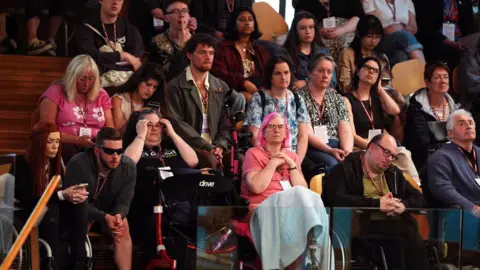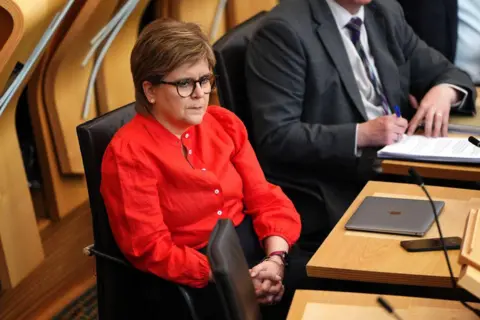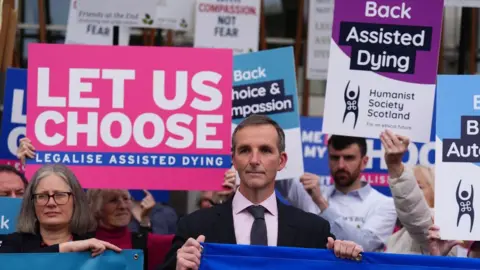What next for Scotland's assisted dying bill?
 Getty Images
Getty ImagesThe Scottish Parliament has given its initial backing to legislation to legalise assisted dying.
A bill tabled by Liberal Democrat MSP Liam McArthur passed its first parliamentary vote by 70 to 56, with one abstention.
But there is still a way to go if it is to become law, and that is not a guaranteed outcome.
A number of MSPs who voted for the proposal voiced reservations and said they wanted to see changes made.
How did the debate play out, and where does it go from here?
It is a landmark moment at Holyrood as the parliament has taken a step closer to legalising assisted dying.
It's a huge result for supporters of the legislation - 70 votes in favour is better even than what McArthur's team had been expecting.
And it underlines the change that has taken place in parliament - it's almost double the number of MSPs (36) who backed the last proposal tabled at Holyrood 10 years ago.
However, many members were clear that this is far from a full stop. A lot more work is still to be done on this legislation.
It was also clear that many felt the pressure of making a decision which is literally about life and death.
 PA Media
PA MediaThese debates are often referred to as "parliament at its best".
That does lead one to briefly wonder about why that phrase is always attached to moments where the whips step back and allow MSPs to speak as individuals.
Perhaps the place would be better off without the partisan influence of the party system.
In any case, it is fair to reflect on the passionately-held views voiced across the chamber, and how they were respectfully heard.
Personal stories
SNP MSP Elena Whitham talked about her mother starving herself to death while suffering from advanced cancer - a process which took two agonising weeks.
You could see Patrick Harvie sitting behind her on the verge of tears before the whole chamber broke into applause.
Edward Mountain spoke against, having pondered his own mortality after his diagnosis with bowel cancer.
Meanwhile, his Tory colleague Sandesh Gulhane is in the position of potentially playing a part in the system in his other job as a doctor.
He talked about the devastation of "hearing families plead through tears that they wouldn't let a dog die like this".
It's striking that powerful contributions were welcomed across the board.
There was none of the partisan us-against-them which often dominates parliamentary debate.
Every member present applauded McArthur when he closed the debate.
 PA Media
PA MediaThere was also some consensus around related issues.
Everyone seemed to agree there is a need for better palliative care, and the government has pledged to bring forward a strategy and delivery plan in the summer.
Plenty of MSPs had personal stories to recount.
The SNP's George Adam spoke movingly about his wife Stacey, who has multiple sclerosis - and who he said should have the right to choose how her life ends.
Pam Duncan-Glancy and Jeremy Balfour talked from the perspective of a disabled person, who could feel a burden to their family. Both said they worried the bill could be a slippery slope.
Many others did not have that kind of direct experience, or the religious conviction driving the position of some. But they certainly heard plenty about the issue, in parliament and beyond.
One MSP told the BBC she received more than 200 emails the night before the vote. Another said he got about 1,600 over the week building up to it.
Labour's deputy leader Jackie Baillie told the chamber that she was still receiving correspondence moments before heading into the debate.
Reciting some of the examples of deeply personal testimony she had been sent, she said that "all of these stories weigh heavily in our decision-making".
 PA Media
PA MediaWe also may never know how big of an impact the interventions from the likes of John Swinney and Nicola Sturgeon had.
While they didn't mount campaigns or try to nudge members into backing their position, the arguments of leadership figures could have had outsize influence in the minds of swithering backbenchers.
Ultimately this was a day for ordinary members. Neil Gray was the only minister to speak in the debate - and even then to underline that he was going to abstain as health secretary.
Party leaders largely stayed out of it too - including Anas Sarwar, to the extent that he didn't even appear to be present.
The Labour leader did register a vote against the bill, but spent the day posting pictures online of himself campaigning in a by-election contest.
There was another theme which crept into the debate - that as pivotal as this moment was, it was far from the final word on this issue.
Labour's Daniel Johnson was the first to say he was voting in favour at stage one, but would "reserve judgement" on the final form of the bill.
He is one of a decent number of members who voiced concerns about various details, but who want the debate to continue through the parliamentary process.
Green MSP Ross Greer put it clearly - he has serious reservations about whether any system of assisted dying could be safe or compassionate.
But he added: "It is parliament's job to wrestle with the most difficult issues facing our society - this issue deserves the opportunity of more detailed scrutiny and for changes to be proposed."
Changes are possible
Stage one is a vote on general principles and the detail of a bill can then be refined to almost any extent when it is amended at stage two.
Consider the government's National Care Service bill, which was amended at stage two to remove the National Care Service. Widespread changes are entirely possible.
Another Labour member, Colin Smyth, said that if this was the final stage three vote, he would be voting against the bill.
But because there is still the scope for it to be amended, he was happy to help it along to the next stage to see how it develops.
This is a double-edged sword. Members may be happy to carry out further work on the bill, but they are under absolutely no illusions about the gravity of that work.
Speech after speech underlined the life-or-death nature of these decisions. There is zero margin for error in making sure the bill is up to scratch.
And if seven members decide that it's not, and opt to switch sides, then the bill could still fall when it comes to the final vote at stage three.
 PA Media
PA MediaWe already know that a number of changes are going to be made during stage two when the health committee starts considering amendments to the bill.
We have seen something similar happen with the Westminster bill on the same topic.
McArthur has already promised to increase the starting age limit from 16 to 18.
And the committee itself has highlighted a range of areas which need attention, including rules around residency and how to fairly assess the decision-making capacity of people with mental disorders.
There are also questions about how it would be paid for given there are many pressures on the health budget as it stands.
The Scottish government has noted that some kind of deal with Westminster will be needed as powers over the drugs which would be involved are not in Holyrood's remit.
It is going to be critical to hammer out every one of these issues if the bill is to become law.
It needs to be absolutely watertight if it is to carry a majority in the final vote.
As Tory MSP Brian Whittle said: "We cannot afford to make a single mistake."
So the work is far from done, and the campaigns will no doubt continue - as will the flow of emails into parliamentary inboxes.
